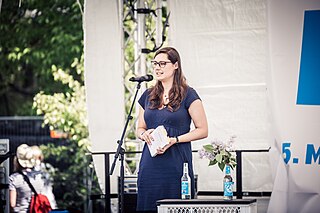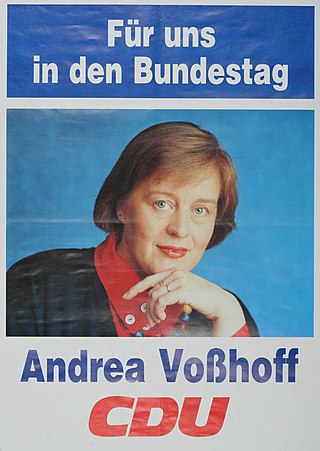
The Chaos Computer Club (CCC) is Europe's largest association of hackers with 7,700 registered members. Founded in 1981, the association is incorporated as an eingetragener Verein in Germany, with local chapters in various cities in Germany and the surrounding countries, particularly where there are German-speaking communities. Since 1985, some chapters in Switzerland have organized an independent sister association called the Chaos Computer Club Schweiz (CCC-CH) instead.

Renate Elly Künast is a German politician of Alliance 90/The Greens party. She was the Minister of Consumer Protection, Food and Agriculture from 2001 to 2005 and subsequently served as chairwoman of her party's parliamentary group in the Bundestag.

The Peaceful Revolution, as a part of the Revolutions of 1989, was the process of sociopolitical change that led to the opening of East Germany's borders with the West, the end of the ruling of the Socialist Unity Party of Germany (SED) in the German Democratic Republic in 1989 and the transition to a parliamentary democracy, which later enabled the reunification of Germany in October 1990. This happened through non-violent initiatives and demonstrations. This period of change is referred to in German as Die Wende.

Gisela Kallenbach is a German politician. She was a Member of the European Parliament for Alliance '90/The Greens, part of the European Greens, from 2004 to 2009. Since 2009, she has been a member of the Parliament of Saxony. From 2000 to 2003, she was International Mayor of the United Nations Interim Administration Mission in Kosovo. She was awarded the Order of Merit of the Federal Republic of Germany in 2001.

Sahra Wagenknecht is a German politician, economist, author, and publicist. Since 2009, she has been a member of the Bundestag for The Left. From 2015 to 2019, she served as the parliamentary co-chair of her party.
Data retention defines the policies of persistent data and records management for meeting legal and business data archival requirements. Although sometimes interchangeable, it is not to be confused with the Data Protection Act 1998.

The Free Workers' Union is an anarcho-syndicalist union in Germany and Switzerland.

European Digital Rights (EDRi) is an international advocacy group headquartered in Brussels, Belgium. EDRi is a network collective of non-profit organizations (NGO), experts, advocates and academics working to defend and advance digital rights across the continent. As of October 2022, EDRi is made of more than 40 NGOs, as well as experts, advocates and academics from all across Europe.

The Alexanderplatz demonstration was a demonstration for political reforms and against the government of the German Democratic Republic on Alexanderplatz in East Berlin on Saturday 4 November 1989. With between half a million and a million protesters it was one of the largest demonstrations in East German history and a milestone of the peaceful revolution that led to the fall of the Berlin Wall and German reunification. The demonstration was organized by actors and employees of theaters in East Berlin. It was the first demonstration in East German history that was organized by private individuals and was permitted to take place by the authorities. The speakers during the demonstration were members of the opposition, representatives of the regime and artists, and included the dissidents Marianne Birthler and Jens Reich, the writer Stefan Heym, the actor Ulrich Mühe, the former head of the East German foreign intelligence service Markus Wolf and Politburo member Günter Schabowski.
Freedom – Civil Rights Party for More Freedom and Democracy, also known as The Freedom, was a political party in Germany which identified as conservative-liberal or classical liberal. The party, described by German mainstream media as right-wing populist, was known for its criticism of Islam.

Felix von Leitner, nicknamed Fefe, is a German IT security expert living in Berlin. He is the main author of the dietlibc, a C standard library. His personal blog posts have received larger media coverage in Germany.

The Monument to Freedom and Unity is a planned national German monument in Berlin commemorating the country's peaceful reunification in 1990 and earlier 18th, 19th and 20th century unification movements.
Digitalcourage – known until November 2012 as FoeBuD – is a German privacy and digital rights organisation. Under the motif of preserving "a world worth living in the digital age", Digitalcourage campaigns for civil and human rights, consumer protection, privacy, freedom of information and related issues. The group has links with organisations such as the German Working Group against Data Retention and the Chaos Computer Club, and it is a member of the umbrella organisation European Digital Rights.

Katharina Nocun is a Polish-German politician and author who, from May 2013 to October 2016, has been the policy coordinator of the Pirate Party of Germany.

Digitale Gesellschaft is a German registered association founded in 2010, that is committed to civil rights and consumer protection in terms of internet policy.

Heiko Josef Maas is a German lawyer and former politician of the Social Democratic Party (SPD) who served as the Federal Minister of Foreign Affairs (2018–2021) and as the Federal Minister of Justice and Consumer Protection (2013–2018) in the cabinet of Chancellor Angela Merkel. Since 2022, he has been practicing as a lawyer.
Katrin Hattenhauer is a German painter and civil rights activist. In the late 1980s she was a member of the GDR-opposition movement. On 4 September 1989 she demonstrated "For an Open Country with Free People", marking the beginning of the Monday demonstrations in Leipzig. Her paintings and social sculptures have been exhibited in Europe.

Patrick Breyer is a German digital rights activist, jurist, Pirate Party Germany politician, and – since 2019 – Member of the European Parliament (MEP). From 2012 to 2017 he was a member of the state parliament of Schleswig-Holstein and from April 2016 until the end of the legislative period he was also the leader of the Pirate group in that assembly. Breyer is one of four European Pirate Party MEPs in the 2019–2024 term along with three Czech Pirate Party members, all of whom are members of the Greens / EFA parliamentary group.

Since April 2020, when Germany's Constitutional Court ruled that the governmental lockdown imposed in March to counter the COVID-19 pandemic did not allow blanket bans on rallies, numerous protests have been held in Germany against anti-pandemic regulations. The protests attracted a mix of people from varied backgrounds, including supporters of populist ideas who felt called to defend against what they saw as an arrogant central government; supporters of various conspiracy theories; and sometimes far right-wing groups. Anti-vaxxers generally also formed a major part of the protesters. Some protesters held strongly negative views towards public media, who they believed to report in an unfair manner; repeatedly, journalists covering the rallies were subjected to harassment and physical attacks. Such attacks were the main reason why Germany slipped from eleventh to 13th place in the Press Freedom Index of Reporters Without Borders, according to a report published on 20 April 2021.

Andrea Voßhoff is a German former lawyer who switched to full-time politics in mid-career (CDU). She served as a member of the Bundestag between 1998 and 2013 when, as a "party list" candidate, she narrowly failed to secure re-election in the Brandenburg-Potsam electoral district.
















